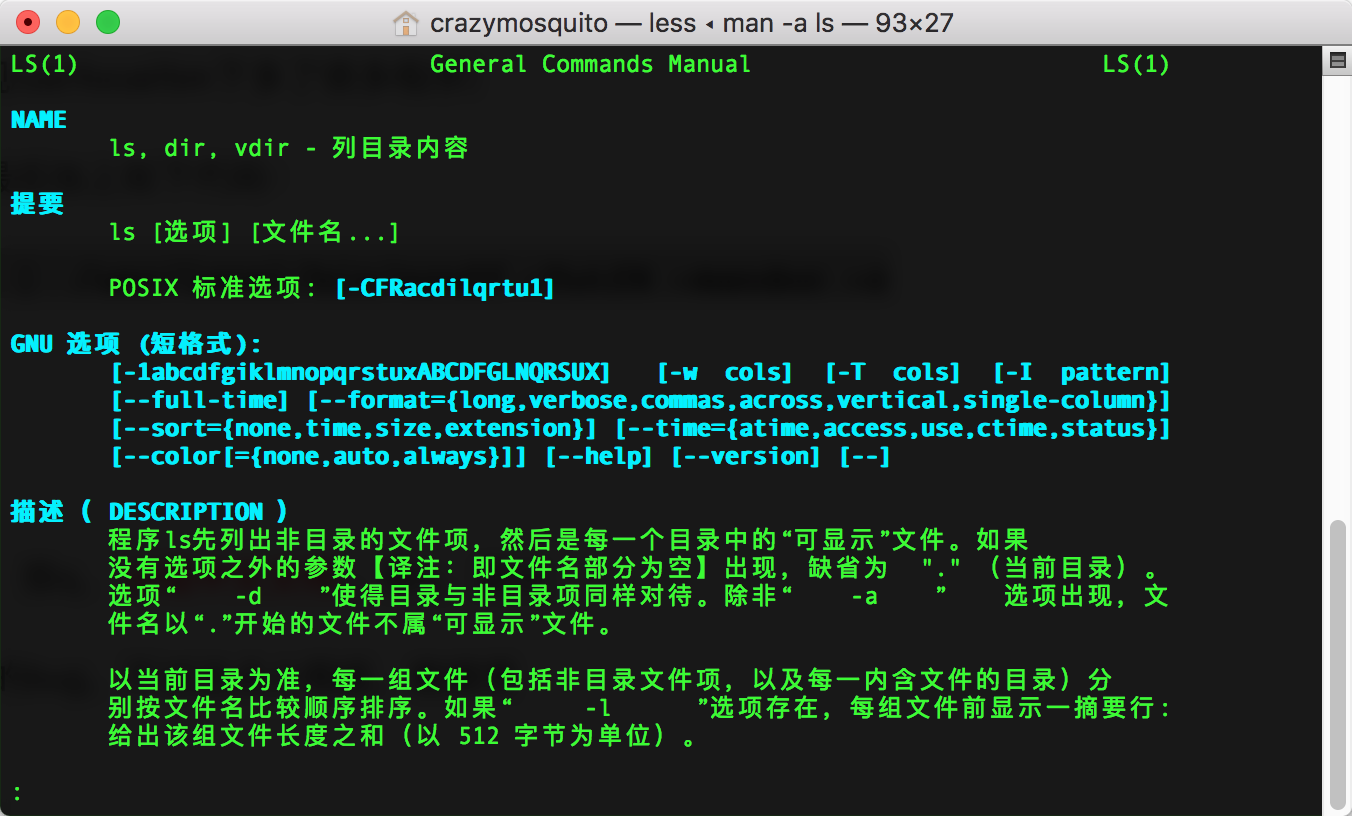课后实践之mybash20155314
课后实践之mybash
实践要求
加分题-mybash的实现
- 使用fork,exec,wait实现mybash
- 写出伪代码,产品代码和测试代码
- 发表知识理解,实现过程和问题解决的博客(包含代码托管链接)
预备知识
-
关于bash
- Bash (GNU Bourne-Again Shell) 是大多数Linux系统以及Mac OS X默认的shell,它能运行于大多数类Unix风格的操作系统之上,甚至被移植到了Microsoft Windows上的Cygwin系统中,以实现Windows的POSIX虚拟接口。此外,它也被DJGPP项目移植到了MS-DOS上。
- bash的命令语法是Bourne shell命令语法的超集。数量庞大的Bourne shell脚本大多不经修改即可以在bash中执行,只有使用了Bourne的特殊变量或内置命令的脚本才需要修改。 bash的命令语法很多来自Korn shell (ksh) 和 C shell (csh), 例如命令行编辑,命令历史,目录栈,$RANDOM 和 $PPID 变量,以及POSIX的命令置换语法: $(...)。作为一个交互式的shell,按下TAB键即可自动补全已部分输入的程序名、文件名、变量名等等。
-
操作系统的核心
- 文件:字节序列
- 虚拟内存:字节数组,抽象出外设和主存
- 进程:操作系统对一个正在运行的程序的一种抽象
-
操作系统的功能
-
“管家婆”:管理各种硬件资源
-
“服务生” :提供接口
-->为用户提供shell(写代码)
-->为程序猿提供系统调用
-
-
关于进程
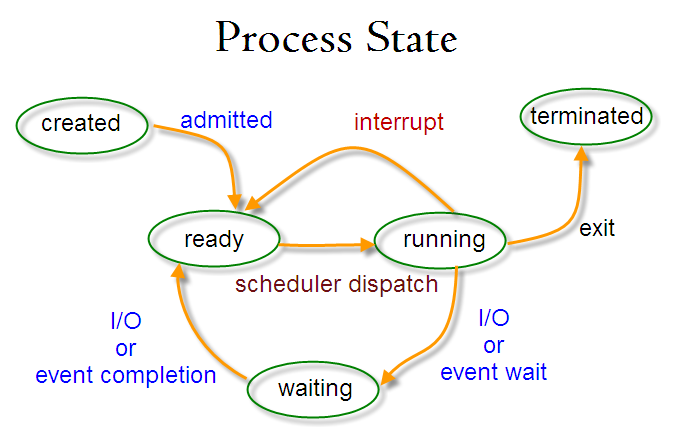
- 进程的状态:
- 创建(created)
- 执行(running)
- 就绪(ready)
- 阻塞(blocked)
- 终止(terminated)
- 进程的状态:
实践过程
准备工作
-
查询相关命令
-
用
man -k process命令查看与进程(process)相关的命令,发现有很多很多:
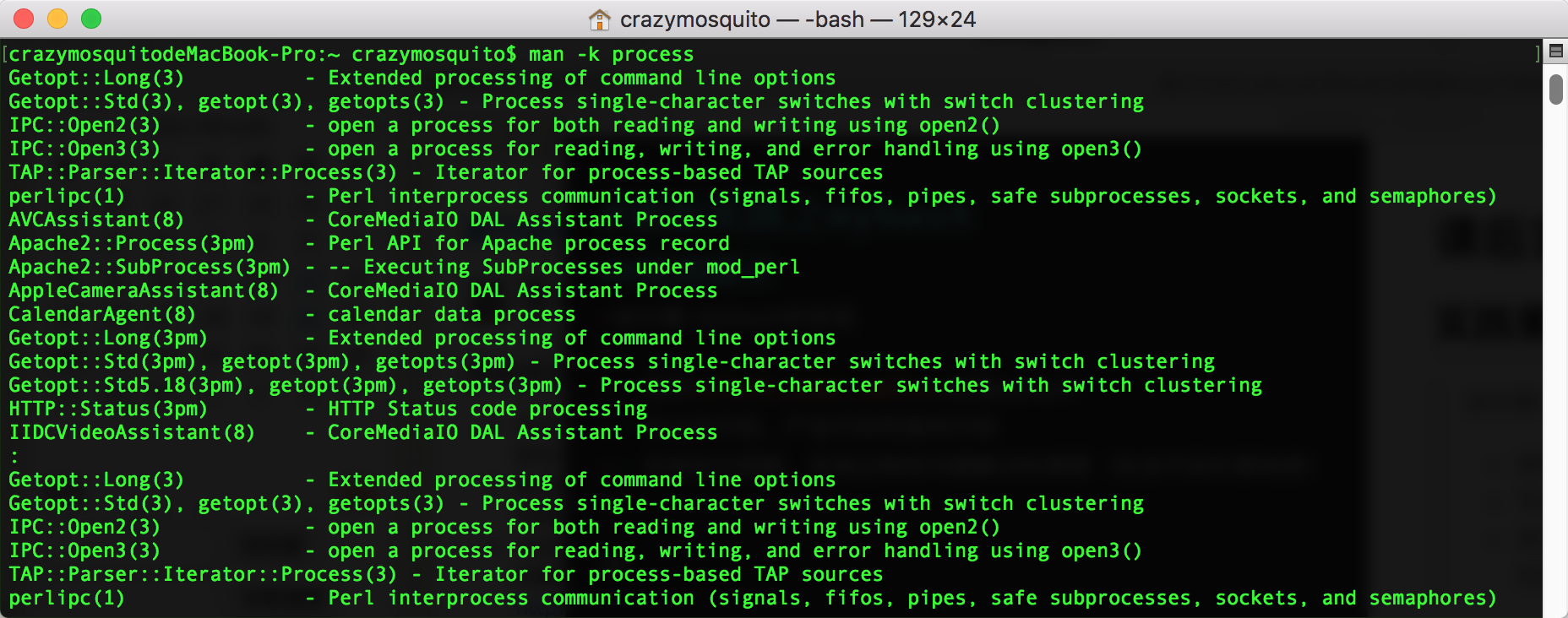
-
再用
man -k process | grep 2命令进一步查看与系统调用相关的命令(参数2表示与系统调用有关),找到fork和wait命令:
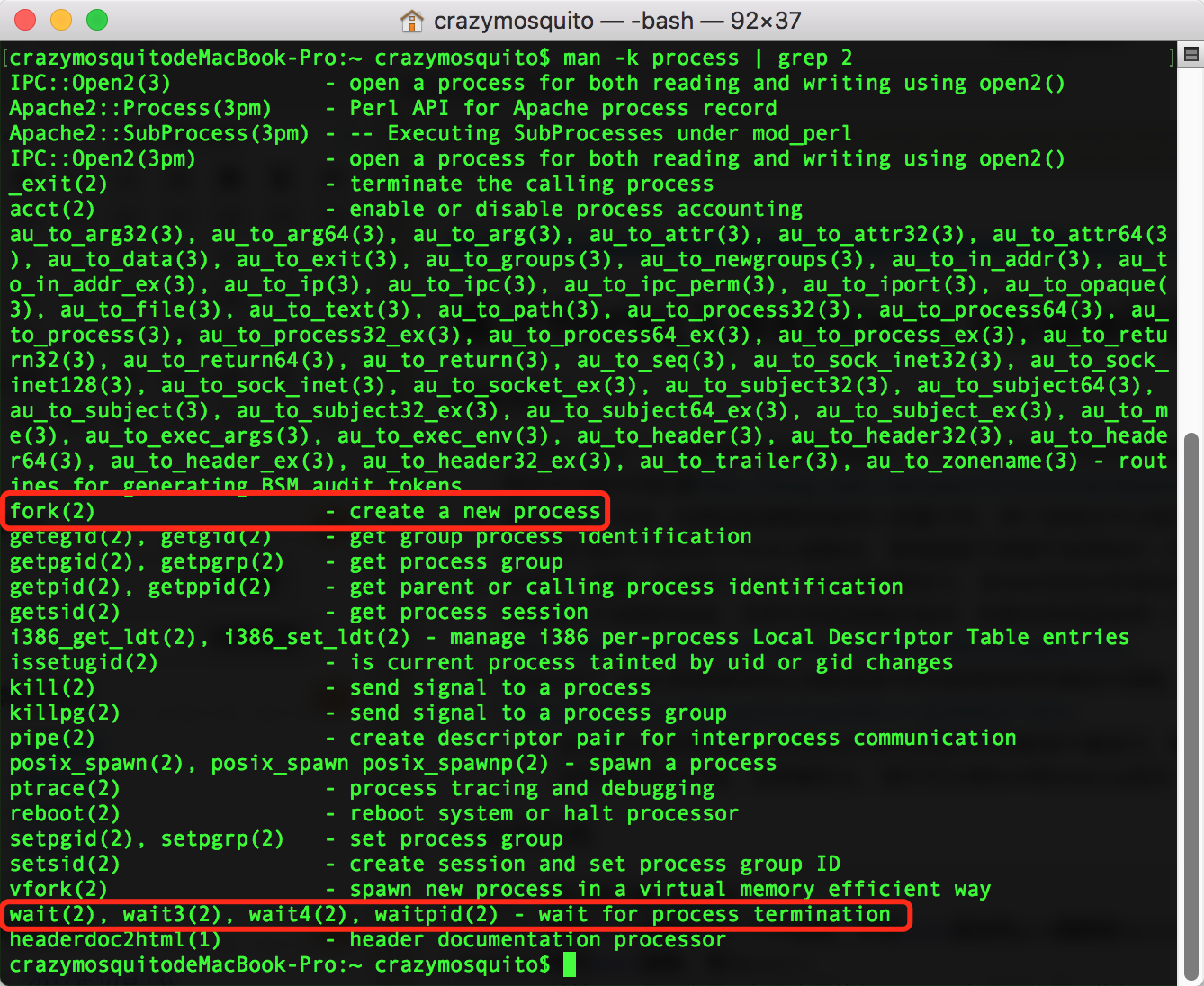
其描述为:fork(2) - create a child process
即fork命令用来创建一个子进程。
wait(2),wait3(2),wait4(2),waitpid(2) - wait for process termination
即wait命令用来等待进程结束。
(后来发现只需查找与创建(create)进程相关的命令
man -k process | grep 2 | grep create就可一步到位,快速找到fork命令:
 )
) -
用
man -k execute | grep 2命令找到execve命令:

其描述为:execve(2) - execute a file
即execve命令用来执行文件。
-
-
模块分析:
-
exec1.c:
#include <stdio.h> #include <unistd.h> int main() { char *arglist[3]; arglist[0] = "ls"; arglist[1] = "-l"; arglist[2] = 0;//NULL printf("* * * About to exec ls -l\n"); execvp("ls", arglist); printf("* * * ls is done. bye"); return 0; }- 功能:
调用execvp()函数,用man命令查看该函数的用法为: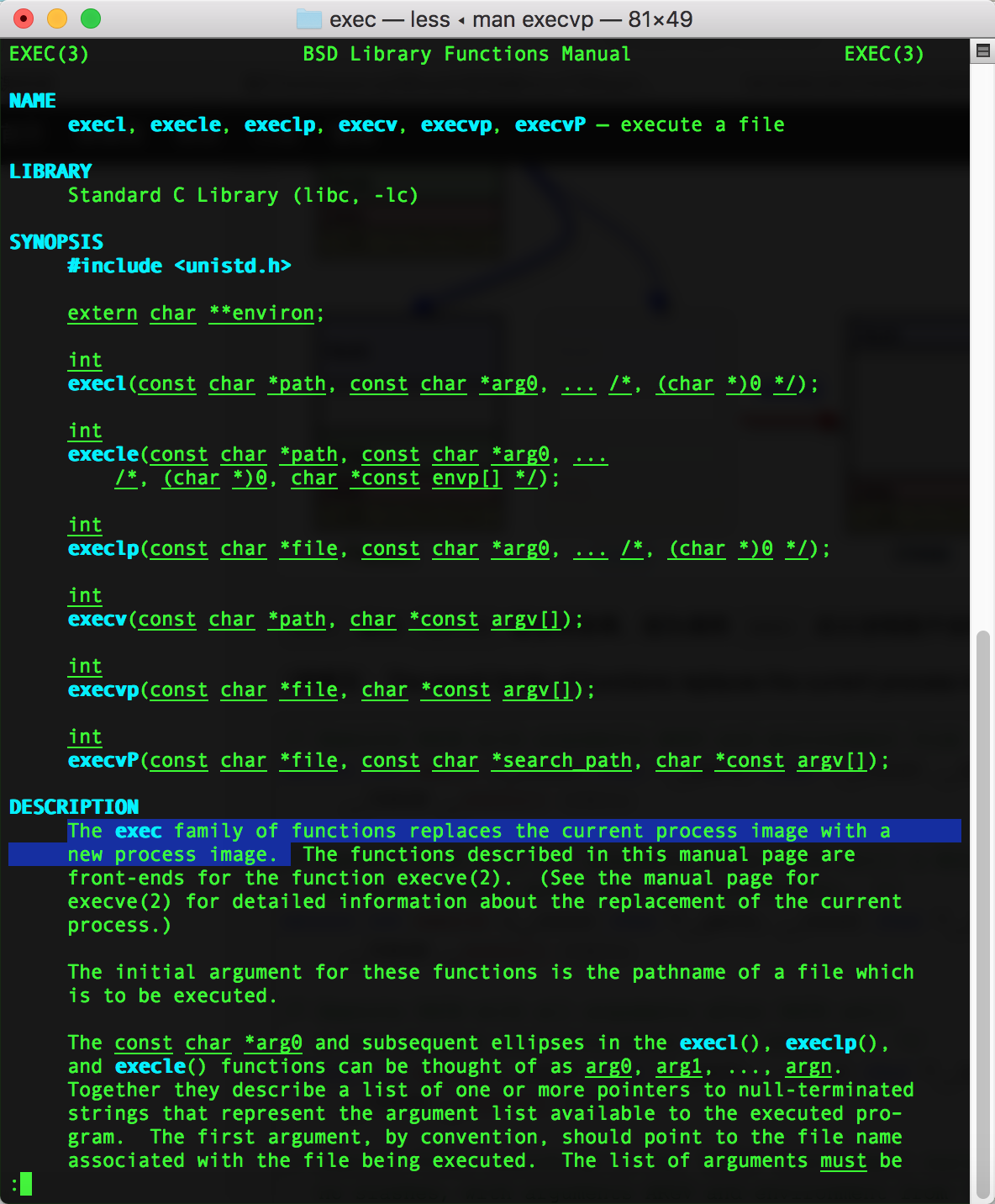
exec函数会将当前的进程替换为一个新的进程,这个新的进程可以由路径或者文件参数指定。 - 运行结果:

- 功能:
-
psh1.c:
#include <stdio.h> #include <stdlib.h> #include <string.h> #include <unistd.h> #define MAXARGS 20 #define ARGLEN 100 int execute(char *arglist[]) { execvp(arglist[0], arglist); perror("execvp failed"); exit(1); } char *makestring(char *buf) { char *cp; buf[strlen(buf) - 1] = '\0'; cp = malloc(strlen(buf) + 1); if (cp == NULL) { fprintf(stderr, "no memory\n"); exit(1); } strcpy(cp, buf); return cp; } int main() { char *arglist[MAXARGS + 1]; int numargs; char argbuf[ARGLEN]; numargs = 0; while (numargs < MAXARGS) { printf("Arg[%d]? ", numargs); if (fgets(argbuf, ARGLEN, stdin) && *argbuf != '\n') arglist[numargs++] = makestring(argbuf); else { if (numargs > 0) { arglist[numargs] = NULL; execute(arglist); numargs = 0; } } } return 0; }- 功能:一次性bash。
- 运行结果:
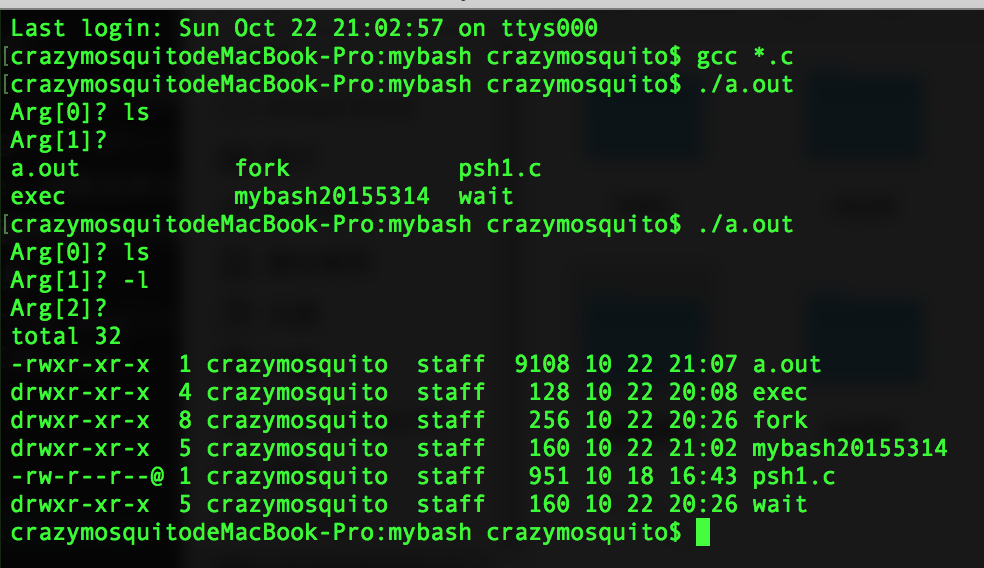
-
forkdemo1.c:
#include <stdio.h> #include <sys/types.h> #include <unistd.h> int main() { int ret_from_fork, mypid; mypid = getpid(); printf("Before: my pid is %d\n", mypid); ret_from_fork = fork(); sleep(1); printf("After: my pid is %d, fork() said %d\n", getpid(), ret_from_fork); return 0; }- 功能:即fork的功能,除pid之外复制(duplicate)出一个一模一样的子进程,如同克隆。
- 运行结果:

-
forkdemo2.c:
#include <stdio.h> #include <unistd.h> int main() { printf("before:my pid is %d\n", getpid()); fork(); fork(); printf("after:my pid is %d\n", getpid()); return 0; }- 功能:调用2次fork会出现4个after,调用n次fork会出现2^n个after。
- 运行结果:

-
forkdemo3.c:
#include <stdio.h> #include <stdlib.h> #include <unistd.h> int main() { int fork_rv; printf("Before: my pid is %d\n", getpid()); fork_rv = fork(); /* create new process */ if (fork_rv == -1) /* check for error */ perror("fork"); else if (fork_rv == 0) { printf("I am the child. my pid=%d\n", getpid()); exit(0); } else { printf("I am the parent. my child is %d\n", fork_rv); exit(0); } return 0; }- 功能:通过
fork()的返回值来区分是父进程还是子进程:如果返回一个大于0的数(子进程的Pid)则为父进程;如果返回值为0则为子进程;如果返回值为负值则出错。 - 运行结果:

- 功能:通过
-
forkgdb.c:
#include <stdio.h> #include <stdlib.h> #include <unistd.h> int gi = 0; int main() { int li = 0; static int si = 0; int i = 0; pid_t pid = fork(); if (pid == -1) { exit(-1); } else if (pid == 0) { for (i = 0; i < 5; i++) { printf("child li:%d\n", li++); sleep(1); printf("child gi:%d\n", gi++); printf("child si:%d\n", si++); } exit(0); } else { for (i = 0; i < 5; i++) { printf("parent li:%d\n", li++); printf("parent gi:%d\n", gi++); sleep(1); printf("parent si:%d\n", si++); } exit(0); } return 0; }-
相关函数:
getpid():获得自己的pidgetppid():获得父进程的pidsleep():延迟指定数量的时间(作为函数参数,单位为s)
-
运行结果:
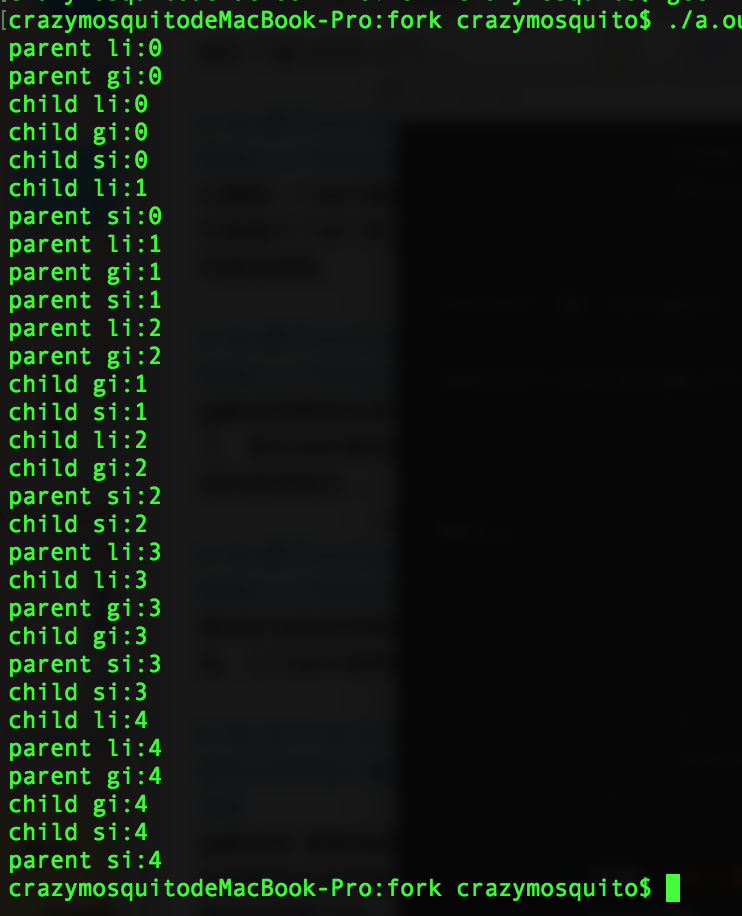
-
-
waitdemo1.c:
#include <stdio.h> #include <stdlib.h> #include <sys/types.h> #include <sys/wait.h> #include <unistd.h> #define DELAY 4 void child_code(int delay) { printf("child %d here. will sleep for %d seconds\n", getpid(), delay); sleep(delay); printf("child done. about to exit\n"); exit(17); } void parent_code(int childpid) { int wait_rv = 0; /* return value from wait() */ wait_rv = wait(NULL); printf("done waiting for %d. Wait returned: %d\n", childpid, wait_rv); } int main() { int newpid; printf("before: mypid is %d\n", getpid()); if ((newpid = fork()) == -1) perror("fork"); else if (newpid == 0) child_code(DELAY); else parent_code(newpid); return 0; }-
运行结果:

-
waitdemo2.c:
#include <stdio.h> #include <stdlib.h> #include <sys/types.h> #include <sys/wait.h> #include <unistd.h> #define DELAY 10 void child_code(int delay) { printf("child %d here. will sleep for %d seconds\n", getpid(), delay); sleep(delay); printf("child done. about to exit\n"); exit(27); } void parent_code(int childpid) { int wait_rv; int child_status; int high_8, low_7, bit_7; wait_rv = wait(&child_status); printf("done waiting for %d. Wait returned: %d\n", childpid, wait_rv); high_8 = child_status >> 8; /* 1111 1111 0000 0000 */ low_7 = child_status & 0x7F; /* 0000 0000 0111 1111 */ bit_7 = child_status & 0x80; /* 0000 0000 1000 0000 */ printf("status: exit=%d, sig=%d, core=%d\n", high_8, low_7, bit_7); } int main() { int newpid; printf("before: mypid is %d\n", getpid()); if ((newpid = fork()) == -1) perror("fork"); else if (newpid == 0) child_code(DELAY); else parent_code(newpid); }- 运行结果:

- 运行结果:
-
-
-
伪代码
mybash:for { 用户输入命令; fork; spid:父进程 子进程:exec }
我的代码
mybash20155314.c:
#include <stdio.h>
#include <stdlib.h>
#include <string.h>
#include <sys/types.h>
#include <sys/wait.h>
#include <unistd.h>
#define MAXARGS 20
#define ARGLEN 100
int mybash20155314(char *arglist[])
{
int pc,pr;
pc=fork();
pr=wait(NULL);
if(pc==0) execute(arglist);
else return 0;
}
int execute(char *arglist[])
{
execvp(arglist[0],arglist);
perror("execvp failed");
exit(1);
}
char *makestring(char *buf)
{
char *cp;
buf[strlen(buf)-1] = '\0';
cp = malloc( strlen(buf)+1 );
if ( cp == NULL ){
fprintf(stderr,"no memory\n");
exit(1);
}
strcpy(cp, buf);
return cp;
}
int main() {
char *arglist[MAXARGS + 1];
int numargs;
char argbuf[ARGLEN];
numargs = 0;
while (numargs < MAXARGS) {
printf("Arg[%d]? ", numargs);
if (fgets(argbuf, ARGLEN, stdin) && *argbuf != '\n')
arglist[numargs++] = makestring(argbuf);
else {
if (numargs > 0) {
arglist[numargs] = NULL;
mybash20155314(arglist);
numargs = 0;
}
}
}
return 0;
}
运行结果
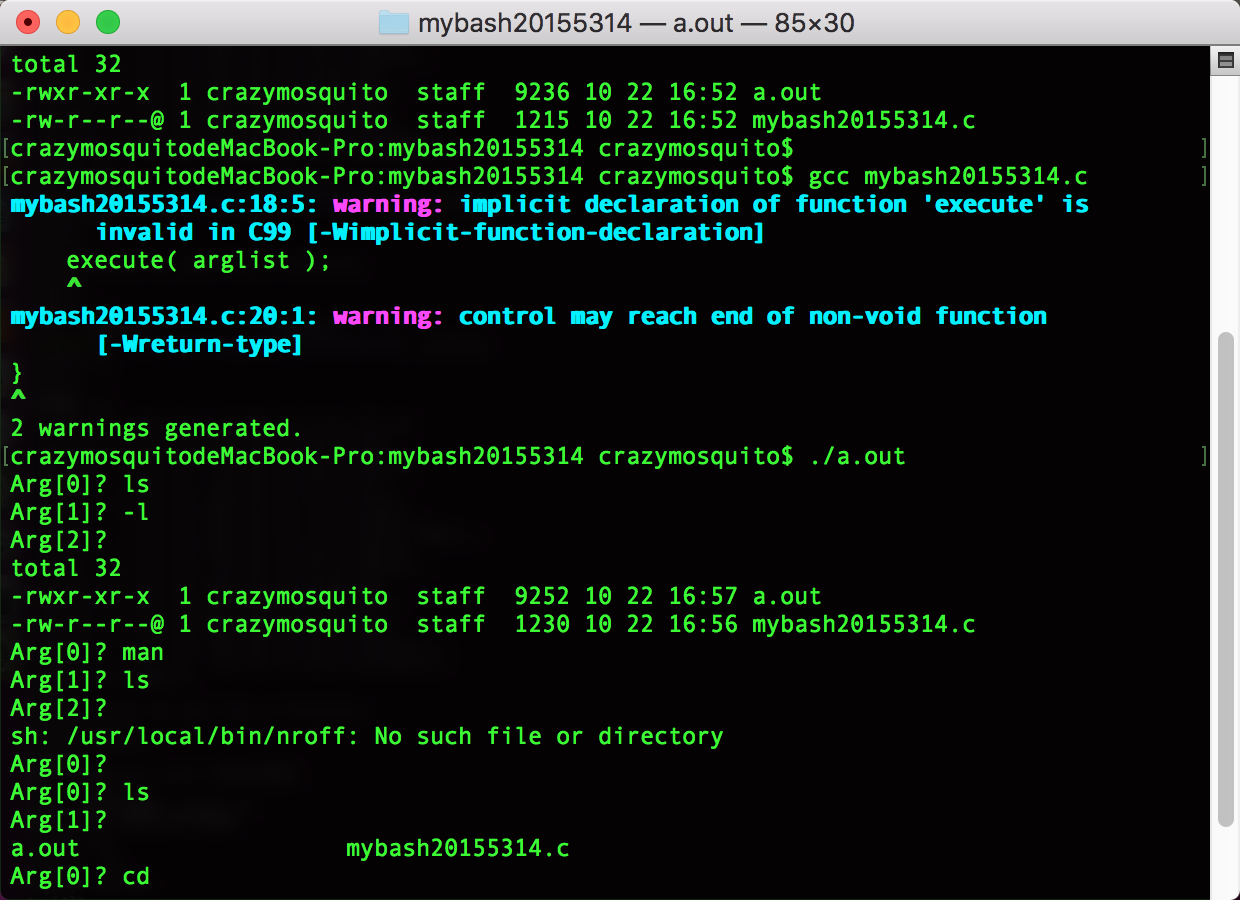
代码调试过程中遇到的问题
macOS High Sierra下终端man命令中文显示问题
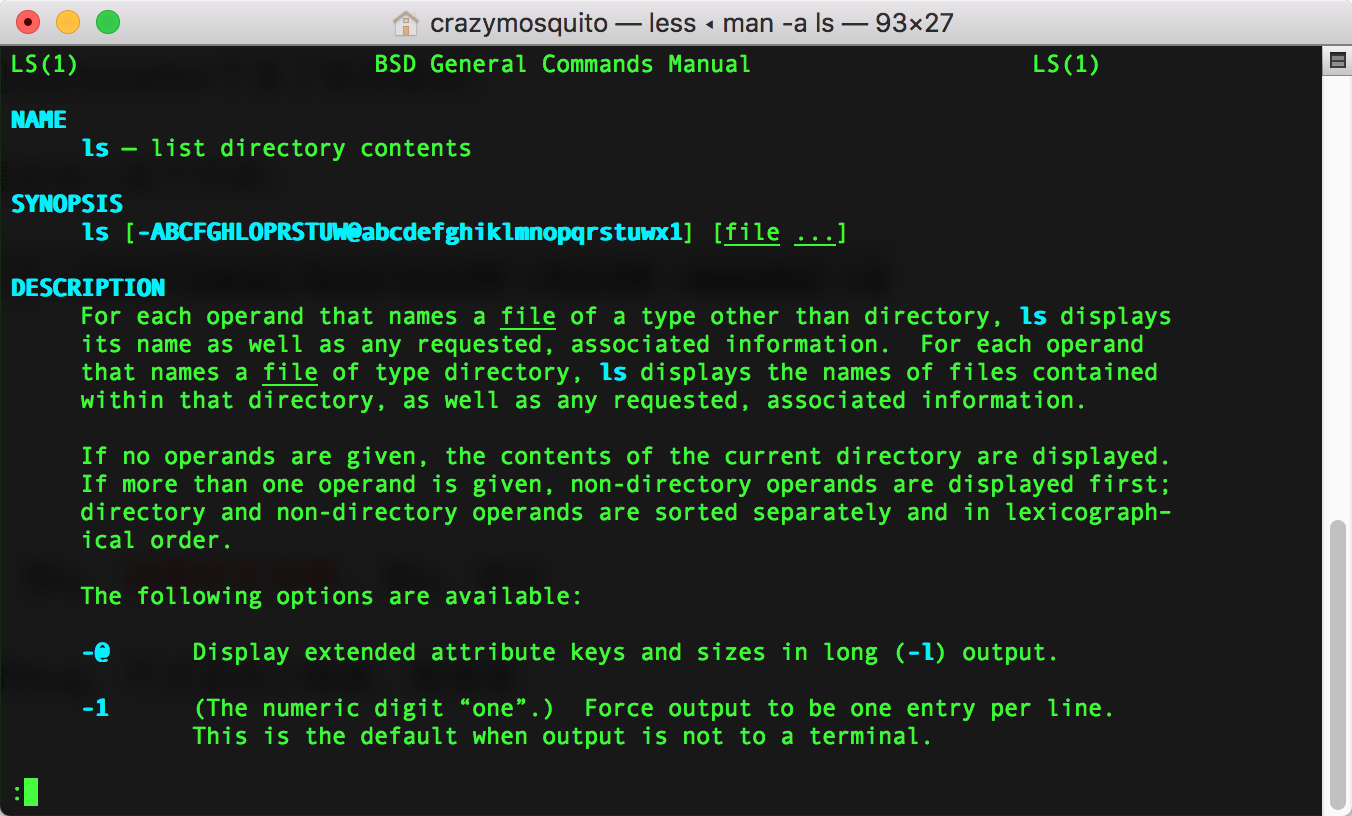
解决方法
